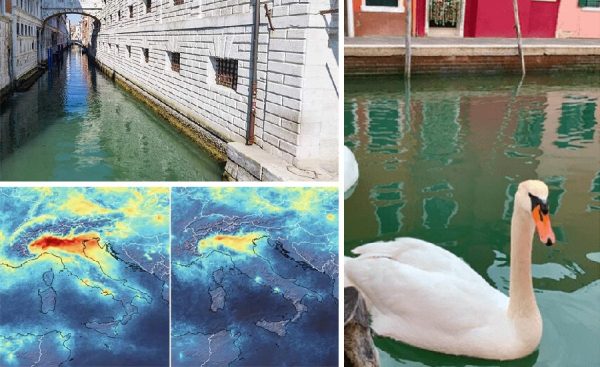
Decline in Air and water pollution due to COVID-19 threat
Recent satellite images showing less air pollution in coronavirus affected countries. Coronavirus pandemic has shut down the countries across world, causing significant decline in not only air pollution also water pollution. The efforts to control coronavirus pandemic resulted in reduced market activity but has positive impact on environment. In Italy it is reported that swans, fishes, ducks and dolphins return to local waters! People uploaded photos of dolphins spotted in the Port of Cagliari and ducks in fountains of Rome!!
A tiny organism has shown its power on humans by causing havoc in day to day life. As of today, globally virus has infected more than 353 759 people, 100,623 people recovered, and 15,419 people died due to infection. To control and flatten the spread, entire world has acted by shutting down social life of the public. Barring hospitals, pharmacy and grocery stores rest of the public access areas are closed for 2 to 3 weeks. People are self-quarantined willingly and cooperating to help government efforts.
After China, Italy is the center of the outbreak. Italy has undergone obvious visual environmental changes without tourism. Major cities around the globe are showing improvement in air quality as well as water quality. In Venice murky waterways are turned clear due to sediments settle down without boat traffic. Otherwise boats constant stirring the water in canals was causing muddy waterways. It means the environmental benefits that we are seeing tells us that humans have been interfering with environment and nature causing all kind of issues.
Satellite images are now showing decline in air pollution in many cities. The stringent restrictions on travel and closure of non-essential activities has bought nitrogen oxide concentration down in India. Nitrogen oxide is a pollutant produced due to combustion of fuel all over India. In Mumbai and Pune nitrogen oxide level has fallen by approximately 45%, in Ahmedabad to 50%. In New Delhi, capital of India some level of decline in air pollution is noted.
According to climate scientist and founder of Pacific Institute in Berkeley – Peter Gleick “ In the midst of this rapidly moving global pandemic, it’s natural that we also think about the other massive threat facing us – global climate change- and what we might learn now to help us prepare for tomorrow. As for the environmental benefits we see from the slowdown of day to day life and economic activity in terms of improving air quality and other slight benefits, it’s a good sign that our ecosystems are somewhat resilient if we don’t completely destroy them”
Human made blunders for time being has come to a stop. According to scientists the unintended air pollution declines from COVID-19 is temporary. The long-term impact of the COVID-19 pandemic on climate change will depend on how all countries and world corporations respond to current economic crisis. Professor of Earth system Science Rob Jackson (of Sandford University) says “the companies that hurting financially will likely to delay or cancel climate friendly projects that require investment up front”
In next few weeks it is critical to see how the world recovers from the pandemic as it is vital in the fight against pollution and climate change.
References:
- https://www.cnbc.com/
- https://www.trueactivist.com/
- https://www.forbes.com/
- https://insideclimatenews.org/
- Image credit: gulfnews.com, Kaveri@Twitter, gonewsindia.com
- Weather image: Curtsy of European space Agency
Author: Sumana Rao | Posted on: March 23, 2020
« Protecting immune system during COVID-19 ourbreak Should we disinfect groceries, phone, mail »






















Write a comment